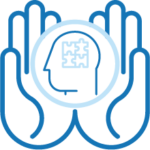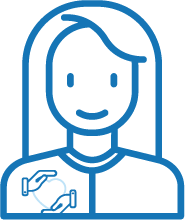Treatment Summary: What to Expect from Recovery Road Medical Center
Please note that due to the shelter-at-home order in response to the COVID-19 Outbreak, our treatment process has changed and adapted to circumstance. Please contact us to find out more or if you have any questions.
Evaluation: All patients are seen by one of the Recovery Road counselors for an assessment and then by one of the medical directors should they not have a personal physician. The patient and the counselor together develop an individual treatment plan with input from the medical director.
Treatment: The program provides groups three hours per day. The first hour and a half of the group focuses on specific topics and skill building. The second hour and a half is a process group. Process groups allow patients to bring up individual issues they are dealing with and allow them to practice skills they are developing as well as to give and receive support.
In the first month, the groups meet 4 days per week. In the second month, they meet 3 days per week for 2 weeks and then 2 days per week for 2 weeks. The duration of the program can be flexible depending on each individual patient’s needs.
Patients also meet individually with their counselor each week to review their progress in their treatment plan. Additionally, patients meet with one of the Medical Directors each week to review medical concerns and their medication.
- Groups for Adult Dual Diagnosis meet from 4:30 PM to 7:30 PM
- Groups for Adult Mental Health/Chronic Pain meet from 10:00 A.M. to 1:00 PM
Ready to Talk to One of Our Counselors?
Call or email us for a confidential and private conversation about what's possible for you.
We accept most health insurance plans.
Don't see your provider? Call us to confirm as we likely accept your insurance.
Want to Know More? Here are the details.
Initial Treatment May Require Detoxification
Detoxification is a step that is taken when a person’s nervous system has adapted to the alcohol or other substance to the extent that if he or she were to just stop using it, the body would have a withdrawal syndrome which might involve:
- Shakes, morning dry heaves, and/or
- Seizures, and/or
- Delirium, confusion and hallucinations
Detoxification is most effectively and safely treated by giving gradually reducing doses of sedative medication over the course of several days as the body adjusts to being off alcohol or substance. The person may need other medical treatment to correct other physical problems related to the substance use at this time as well.
A physician is the best person to make the determination as to how much help a person might need with detoxification.
At Recovery Road Medical Center we have board certified physicians who can assist the patient in getting the appropriate form of detoxification. After the patient has had an intake evaluation with the counselor, the physician is called to discuss the need for detoxification.
Detoxification may require a hospital or can be done in an outpatient setting with close medical monitoring. The physicians at Recovery Road Medical Center are able to assist with both inpatient and outpatient detoxification.
 The Treatment Process
The Treatment Process
Recovery is a retraining process. It is not just an educational process. It involves the development of new ways of reacting that need to become automatic.
New reactions need to be developed in a variety of settings and situations. At present, there is no treatment that can return a person who has lost control over alcohol, for instance, back into a controlled drinker. Instead, recovery involves changes in the following areas:
New ways of reacting include:
- New social and recreational activities that do not involve drinking
- New rewards in a person’s life
- New ways of reacting to feelings that do not involve drinking
- New coping skills that do not involve drinking
- New roles in one’s family that do not involve drinking
- New non-drinking friends
- New ways of thinking about oneself that do not involve drinking.
We do not expect a person to have confidence in themselves when they start treatment. The only way to show motivation for treatment is to show up for treatment and do the exercises and follow the instructions for retraining that are provided. Overtime confidence in a new way of reacting will develop.
Treatment is carried out in a variety of settings depending on how much structure is required to keep the addiction in check while the person is developing new skills.
Medications are also used in alcoholism or opioid treatment. Antabuse(disulfiram), for instance, is used to prevent impulsive drinking, as the alcoholic knows that if they drink within 6 days of use of Antabuse they can get very sick. Campral(acamprosate) is used to help the nervous system restabilize when it has been used to being on alcohol chronically. Revia(naltrexone) is used to blunt the rewarding effects of alcohol, so that if a person does start to drink while in treatment it is less likely to turn into a larger binge.
By themselves, however, medications do not bring on new ways of reacting. But, blocking the rewarding effects of alcohol or other drugs can begin the brain to look elsewhere for reward and to break the hold that the alcohol has on the person’s thinking.
The physicians at Recovery Road are able to prescribe all these medications to assist with recovery.
 Ongoing Recovery
Ongoing Recovery
Ongoing recovery is necessary for the maintenance of new ways of living and reacting. When athletes achieve a certain level of skill, they recognize that they need to continue to practice what they have learned or they will lose their skills.
Because the disease of addiction involves a very primitive part of the brain that only learns through experience, the recovering person has to continue to practice the new recovery skills to maintain sobriety.
Patients generally maintain these skills by participating in ongoing recovery groups such as the 12 step programs. The Twelve Steps Programs are not affiliated with any treatment program. It is a self help group which has been guided by a series of principles since its founding in 1932.
Its first step involves acknowledging that the person cannot control alcohol and that his or her life has become unmanageable. This is stated not as a criticism, but as a respectful acknowledgment of the power of the addiction and the awareness that future efforts to control the drug are doomed to failure.
The next 11 steps focus on developing a new spiritual basis for recovery. Members are expected to get a sponsor who will help them go through the steps.
Have a question?
On a mobile phone? You can click to call us right now.








